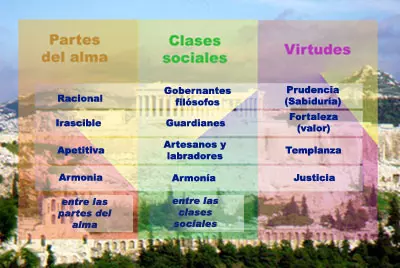For Plato, dialectics and a mor are the paths to ideas. But by themselves they are not enough: virity is necessary, which is also the way to Good and Justice. Moreover, the isolated man cannot be good or wise: he needs the political community (the State). Thus, virtue and the state allow access to the Idas. But these, in turn, are their ultimate foundation.
It cannot be said that there is a stable concept of virtue for Platonic philosophy but concepts that complement each other:
Virtue as Wisdom: It is the Socratic concept, only now it is of higher order: it refers to the knowledge of the Ideas of Good, Justice, Courage, Piety... In this way, Plato tries to overcome the relativism of virtue as the sophists understood it and to achieve a unification of all virtues in the idea of Good.
Virtue as Purification: The virtuous man is the one who purifies his soul and detaches it from the body in order to gain access to Ideas. The Pythagorean influence is observed in this concept. In the Philebo, Plato will admit, however, that a “good” and virtuous life is a “mixed” life in which one must also know how to accept pleasure with some restraint.
Virtue as Harmony: Justice is considered the fundamental virtue and consists of “the agreement of the three parts of the soul, exactly like the three terms of a harmony, that of the serious rope, that of the high and that of the middle”. Harmony arises when “each part does its own” in such a way that they “dominate or are dominated by one another according to nature”.
The Platonic city consists of three social classes that correspond to the three parts of the soul, each class is assigned a task and a virtue.
= = == =
 Social organization is strictly hierarchical, since not all men are endowed by nature and should not be engaged in the same tasks.
Social organization is strictly hierarchical, since not all men are endowed by nature and should not be engaged in the same tasks.
Each social class manifests the predominance of a part of the soul and therefore must be educated according to the functions to be performed. The Platonic state is therefore an educational institution. The existence of citizens is understood according to the good of the community. Plato foresee a total “communism” for the higher social classes: the abolition of private property and the family, so rulers and warriors would be safe from the dangers of their personal ambition or those of their caste.